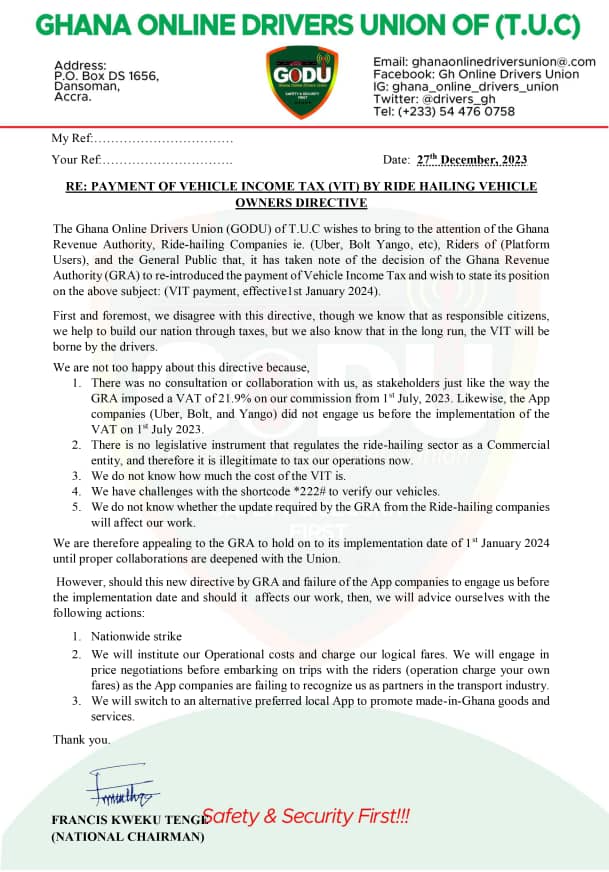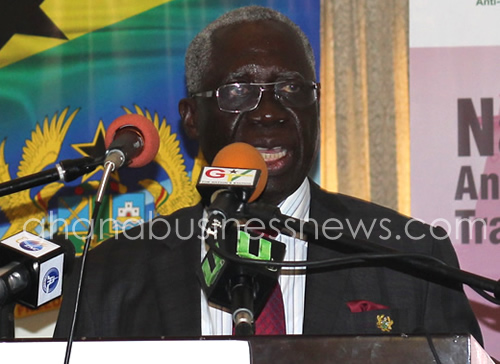

 There is an imminent nationwide strike by the Ghana Highway Authority (GHA) workers that threatens to paralyze the country’s road transport sector and create a dangerous vacuum in axle load enforcement across Ghana’s major highways, potentially triggering a crisis that could reverberate through every sector of the nation’s economy.
There is an imminent nationwide strike by the Ghana Highway Authority (GHA) workers that threatens to paralyze the country’s road transport sector and create a dangerous vacuum in axle load enforcement across Ghana’s major highways, potentially triggering a crisis that could reverberate through every sector of the nation’s economy.
An internal communication, obtained from reliable sources within the GHA, details plans for an indefinite industrial action set to commence on November 12, 2024, if the government fails to meet workers’ demands by November 7. The strike would affect critical operations including axle load stations, potentially creating a free-for-all situation for overloaded vehicles on Ghana’s roads, with implications that could extend far beyond immediate transportation concerns.
The impending crisis stems from fierce opposition to the implementation of the National Roads Authority (NRA) Act 2024 (Act 1118), which seeks to merge the GHA with the Department of Urban Roads (DUR) and Department of Feeder Roads (DFR).
The workers have issued a two-pronged ultimatum that strikes at the heart of the controversy: the removal of Engineer I. K. Mensah and its retired Chief Executive, Engineer Collins B. Donkor within seven working days, and the complete revocation of the NRA Act within 14 working days. This demand reflects deep-seated concerns about institutional autonomy and governance within Ghana’s road sector.
Transport industry experts, drawing on decades of infrastructure management experience, warn that the absence of axle load enforcement could lead to widespread abuse by transporters, potentially causing accelerated deterioration of road infrastructure. “The suspension of axle load monitoring would be catastrophic,” says Dr. Samuel Mensah, a transport policy analyst with over 20 years of experience in infrastructure development. “Overloaded trucks can cause more damage to our roads in a few weeks than years of normal usage. We’re looking at potential damage that could take years and billions of cedis to repair.”
The comprehensive nature of the planned strike action, as outlined in the circular signed by the National Chairman of the GHA Senior Staff Association, Oswald Kwame Okafa Amanfu and National Chairman of the GHA Workers Union, Noble Yasroku, (CBMWU-TUC), reveals the full scale of the impending disruption. The action would affect operations at the head office, regional offices, road and bridge maintenance units, tollway stations, and resident engineers’ offices nationwide, effectively bringing Ghana’s road maintenance and monitoring infrastructure to a complete standstill.
Industry insiders note that the axle load stations, which serve as crucial checkpoints for preventing overloaded vehicles from damaging Ghana’s road infrastructure, represent just the tip of the iceberg. These stations, equipped with sophisticated weighing technology and staffed by trained personnel, play a vital role in preserving road integrity. Their closure would remove a critical safeguard against infrastructure abuse, potentially leading to widespread flouting of load restrictions across the country’s major transport corridors.
The Ghana Haulage Transport Owners Association, representing over 4,000 transport operators nationwide, has raised significant concerns about the potential chaos that could ensue. “While we don’t condone overloading, some transporters might see this as an opportunity to maximize profits at the expense of road safety and infrastructure,” stated their spokesperson, adding that the absence of enforcement could create unfair competition and pressure even law-abiding operators to overload their vehicles to remain competitive.
The strike threat has gained considerable momentum following earlier protests at the GHA yard, where workers displayed powerful messages such as “Mr. President, Ghana Highway Authority cannot be reduced to a division” and “Stop this evil against GHA.” The workers’ argument that GHA, as the pioneering institution that established both DUR and DFR, should maintain its autonomy rather than being subordinated under the new authority, reflects deep historical and institutional tensions within Ghana’s road sector administration.
A comprehensive technical analysis conducted by infrastructure experts reveals a disturbing pattern of potential cascading failures that could emerge from even a short disruption in routine road maintenance. The assessment indicates that the carefully calibrated maintenance schedules currently in place serve as a critical defense against infrastructure deterioration. When these schedules are disrupted, the consequences extend far beyond simple maintenance delays – they can trigger a multiplier effect where minor issues rapidly evolve into major structural problems.
The technical evaluation has highlighted several high-priority areas that require continuous attention to maintain road network integrity. Critical maintenance activities currently at risk include essential pothole repairs, drainage system maintenance, and vegetation management along roadsides. The situation becomes particularly critical given Ghana’s approaching rainy season, a period historically characterized by increased stress on road infrastructure due to heavy precipitation and elevated flooding risks. During this vulnerable period, any lapse in routine maintenance could accelerate road deterioration significantly, potentially leading to structural failures within weeks rather than the months or years that would typically be expected under normal maintenance conditions.
The analysis suggests that what might appear as minor damage today – such as small surface cracks or slight drainage blockages – could rapidly deteriorate into major structural failures requiring costly reconstruction rather than simple repairs. This exponential escalation of infrastructure damage could translate into repair costs many times higher than those associated with routine maintenance, potentially straining national infrastructure budgets beyond sustainable levels.
The situation is further complicated by the prospect of Ghana being left without qualified personnel to address emergency situations. Sources within the GHA technical division estimate that a two-week suspension of maintenance activities could create an unprecedented three-month backlog of repairs, with the potential for this timeline to extend significantly if weather conditions deteriorate or if overloaded vehicles cause accelerated damage during the enforcement vacuum.
The economic implications of the strike extend far beyond the immediate transport sector. With resident engineers joining the strike, dozens of ongoing construction projects across the country face immediate suspension. This technical supervision vacuum threatens to delay critical infrastructure development projects worth hundreds of millions of cedis, potentially inflating construction costs and delaying crucial economic development initiatives.
The Ghana Chamber of Commerce, representing businesses across the country, has conducted an impact assessment that paints a grim picture of the potential economic fallout. Their analysis suggests that prolonged infrastructure deterioration could force many businesses to seek alternative, often more expensive, transportation routes, leading to increased operational costs that would inevitably be passed on to consumers. Small and medium-sized enterprises, which form the backbone of Ghana’s economy, would be particularly vulnerable to these disruptions.
As the November 7 deadline looms, the standoff between GHA workers and government authorities has reached a critical phase. A former President of the Ghana Institute of Engineers, who asked for anonymity, has conducted a comprehensive analysis warning that the combined impact of suspended maintenance and unrestricted axle loads could set Ghana’s infrastructure development back by several years.
The Minister for Roads and Highways, Asenso Boakye in a recent high-stakes meeting with GHA workers and management, attempted to broker a resolution to the looming crisis. However, the talks reached an impasse, highlighting the deep divide between the workers’ fundamental demands and the government’s unwavering stance on its road sector reform agenda. The meeting, which lasted several hours, ended inconclusively despite intensive discussions aimed at finding middle ground.
Sources familiar with the negotiations reveal that while both parties expressed willingness to dialogue, the core issues remain unresolved. The workers maintained their position regarding the withdrawal of the NRA Act 2024 (Act 1118) and leadership changes, while the government team, led by the Minister, stood firm on implementing the sector’s reform policies. This deadlock has heightened concerns about the likelihood of averting the impending strike as the November 7 deadline approaches.
The inconclusive outcome of this crucial meeting has intensified anxieties across various sectors, as stakeholders recognize that time is running out to prevent what could become one of the most disruptive industrial actions in Ghana’s road sector history. The failure to reach an agreement at this ministerial-level intervention suggests that resolving the dispute may require significant compromises from both parties or possibly intervention at an even higher governmental level.
As tensions escalate and the deadline approaches, the nation watches anxiously, hoping for a resolution that can preserve both worker rights and infrastructure integrity. With Ghana’s economic growth and development hanging in the balance, the coming days will prove crucial in determining whether this unprecedented crisis can be averted before it inflicts lasting damage on the nation’s critical infrastructure network. The resolution of this standoff could set a precedent for future public sector reforms and infrastructure management across West Africa, making its outcome all the more significant for regional development.
By Innocent Samuel Appiah
The post Looming Ghana Highway Authority strike threatens nationwide chaos appeared first on Ghana Business News.
Read Full Story
















Facebook
Twitter
Pinterest
Instagram
Google+
YouTube
LinkedIn
RSS